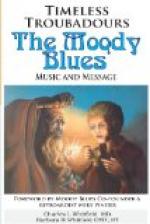Henceforward, Bertran remained faithful to Richard, and directed his animosity chiefly against the King of Aragon. At the same time it appears that he would have been equally pleased with any war, which [62] would have brought profit to himself, and attempted to excite Richard against his father, Henry II. This project came to nothing, but war broke out between Richard and the French king; a truce of two years was concluded, and again broken by Richard. The Church, however, interfered with its efforts to organise the Third Crusade, which called from Bertran two sirventes in honour of Conrad, son of the Marquis of Montferrat, who was defending Tyre against Saladin. Bertran remained at home in Limousin during this Crusade; his means were obviously insufficient to enable him to share in so distant a campaign; other, and for him, equally cogent reasons for remaining at home may be gathered from his poems. There followed the quarrels between Richard and the French king, the return to France of the latter, and finally Richard’s capture on the Illyrian coast and his imprisonment by Henry VI. of Austria, which terminated in 1194. Richard then came into Aquitaine, his return being celebrated by two poems from Bertran.
The Provencal biography informs us that Bertran finally became a monk in the Order of Citeaux. The convent where he spent his last years was the abbey of Dalon, near Hautefort. The cartulary mentions his name at various intervals from 1197 to 1202. In 1215 we have the entry “octavo,[63] candela in sepulcro ponitur pro Bernardo de Born: cera tres solidos empta est.” This is the only notice of the poet’s death.




